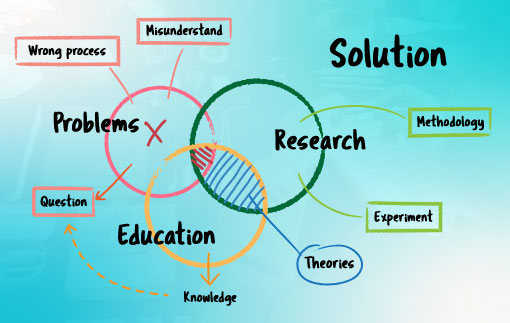Course Offerings
Fundamentals of Research Methodology

Objective: Introduce participants to the essential concepts of research design, types, and approaches.
Topics Covered:
- Climate-smart agriculture
- Sustainable horticulture and agribusiness
- Food security and nutrition-sensitive farming
- Value chain analysis and extension services
Proposal Writing for Research Projects

Objective: Build capacity to write strong, fundable research proposals.
Topics Covered:
- Identifying research gaps
- Formulating research questions and hypotheses
- Writing problem statements and objectives
- Budgeting and timeline planning
Scientific Report and Article Writing

Objective: Train participants to write academic reports and manuscripts for publication.
Topics Covered:
- IMRAD structure (Introduction, Method, Results, and Discussion)
- Literature review techniques
- Referencing styles (APA, IEEE, etc.)
- Avoiding plagiarism and using Turnitin/Grammarly
Systematic and Scoping Reviews (PRISMA-based)

Objective: Guide researchers in conducting evidence-based reviews for journal publication.
Topics Covered:
- PRISMA protocol and search strategies
- Inclusion/exclusion criteria
- Data extraction and synthesis
- Writing results and discussion
Data Collection and Management Tools

Objective: Provide hands-on training on digital tools for efficient data collection.
Topics Covered:
- Google Forms
- KoboToolbox
- MS Excel basics for data handling
Publishing in High-Impact Journals

Objective: Familiarize scholars with the process of submitting and revising manuscripts.
Topics Covered:
- Targeting the right journal
- Responding to reviewers’ comments
- Open access vs. traditional journals
- Avoiding predatory journals
Qualitative Data Analysis and NVivo Training

Objective: Equip participants with the skills to analyze qualitative data systematically using manual and software-based methods.
Topics Covered:
- Coding techniques (open, axial, selective)
- Thematic and content analysis
- Using NVivo for data organization and visualization
- Interpreting qualitative findings for reports and publications
Mixed Methods Research Design

Objective: Train researchers to integrate quantitative and qualitative approaches effectively.
Topics Covered:
- Types of mixed methods (sequential, convergent, embedded)
- Design frameworks and rationale
- Data integration strategies
- Challenges and solutions in mixed methods research
Research Ethics and Academic Integrity

Objective: Foster responsible conduct in academic research and publishing.
Topics Covered:
- Ethical approval and informed consent
- Data privacy and participant confidentiality
- Avoiding fabrication, falsification, and plagiarism
- Understanding AI-generated content and ethical concerns
Monitoring, Evaluation, and Learning (MEL) in Research Projects

Objective: Provide practical skills for tracking progress and impact in research or development projects.
Topics Covere
- Developing indicators and logframes
- Baseline, midline, and endline surveys
- Tools for data monitoring (Excel dashboards, mobile apps)
- Reporting and feedback loops for adaptive learning
